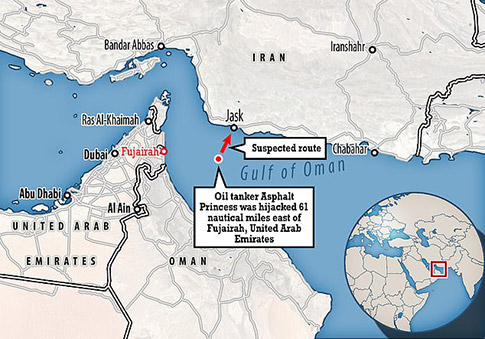The attack on an Israeli owned tanker in the Persian Gulf, last week has emphasized once again the rivalry between Iran, Saudi Arabia and Israel in this volatile region.
The British press reported that “Iran and Saudi Arabia have been regional rivals for more than three decades. Most recently, Saudi Prince Mohammed bin Salman said it was impossible for Riyadh to have a dialogue with Tehran. “Its (Iran’s) logic is that the Imam Mahdi will come and they must prepare the fertile environment for the arrival of the awaited Mahdi and they must control the Muslim world,” he said in a televised interview on May 2, 2017.
“Tensions date back to the 1979 Iranian revolution. The Saudi monarchy, which based its legitimacy on Islam, felt its dominance threatened by the establishment of the Islamic Republic.”
The attack last week has brought the issue to boiling point, and it reminds us of the fact that this region is divided on a north-south basis.
The report continued, “Last week, two crew members were killed in a drone strike, off the Gulf of Oman coast, on the oil tanker ‘Mercer Street’, bound for the Middle East. This included citizens of Britain and Romania. The repercussions were felt internationally. The US and British foreign ministries have expressed outrage over the attack. British Prime Minister Boris Johnson warned Iran to be prepared for the consequences, but it was not clear as to what action the western countries planned to take against Iran.
“Leading British newspapers reported the news, citing sources in the Foreign and Defence ministries. Various options are being explored, for action against Iran. A Defence Ministry source said there was a strong possibility of cyberattacks being used. At the same time, use of special forces is also being suggested. British Special Forces personnel have been deployed in the Middle East for the past few weeks. The newspaper claimed that the task of destroying the drone command centre in Iran, which was responsible for the attack on the fuel tanker, could be given to the Special Forces.”
It is difficult to know where this particular incident could lead. However, the scriptures are clear that there will be contending northern and southern powers in the Middle East at the time of the end. Daniel 11:40-45 reads:

The location of the hijacking of the oil tanker Asphalt Princess.
“At the time of the end shall the king of the south push at him: and the king of the north shall come against him like a whirlwind, with chariots, and with horsemen, and with many ships; and he shall enter into the countries, and shall overflow and pass over. He shall enter also into the glorious land, and many countries shall be overthrown: but these shall escape out of his hand, even Edom, and Moab, and the chief of the children of Ammon.
He shall stretch forth his hand also upon the countries: and the land of Egypt shall not escape. But he shall have power over the treasures of gold and of silver, and over all the precious things of Egypt: and the Libyans and the Ethiopians shall be at his steps. But tidings out of the east and out of the north shall trouble him: therefore he shall go forth with great fury to destroy, and utterly to make away many. And he shall plant the tabernacles of his palace between the seas in the glorious holy mountain; yet he shall come to his end, and none shall help him.”
These passages from Daniel are complemented by Ezekiel 38, where we find the same north and south alignment. In Ezekiel 38 the northern power is described as Gog who is prince of Rosh — an ancient name for Russia. Allied with Gog are a number of powers, including; "Persia, Ethiopia, and Libya” (verse 5). Persia, of course, is the original name of Iran. The Tarshish power described in Ezekiel 38 can be identified as Great Britain.
It is then with interest that we watch these events in the Persian Gulf, as Iran, Great Britain and American engage in hostilities, which could easily lead to a greater conflict.
Come back next week God willing to www.bibleinthenews.com — this has been Paul Billington joining you.